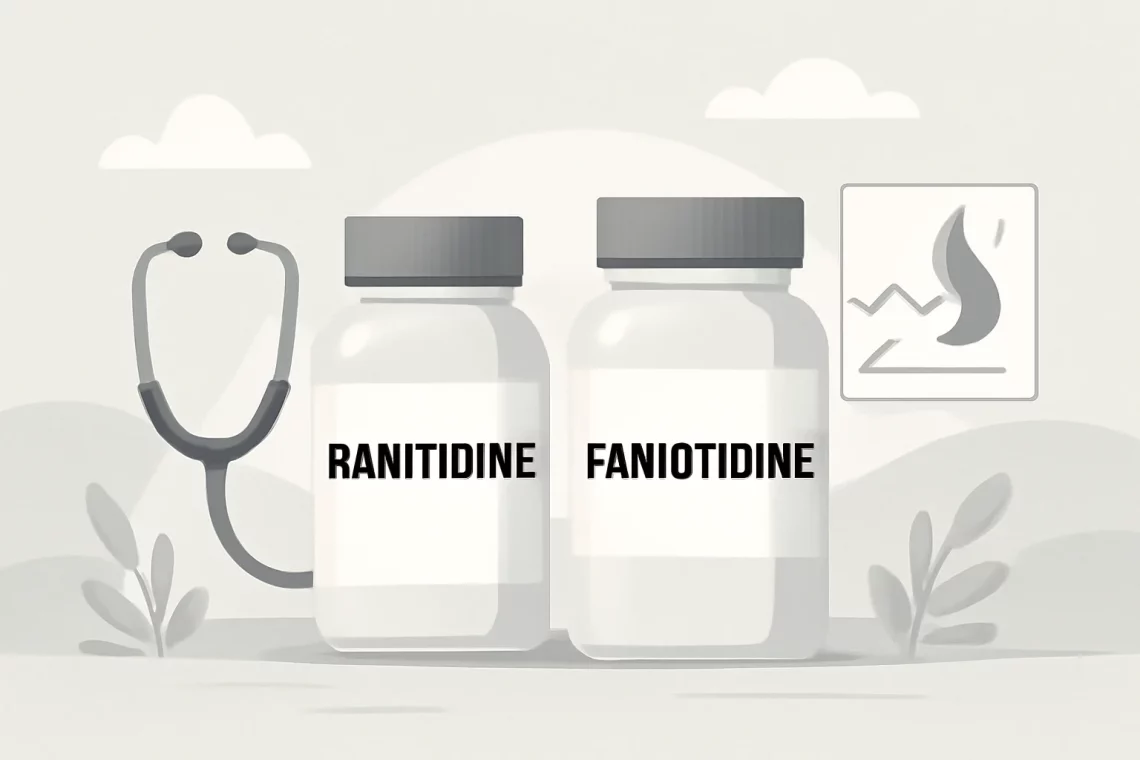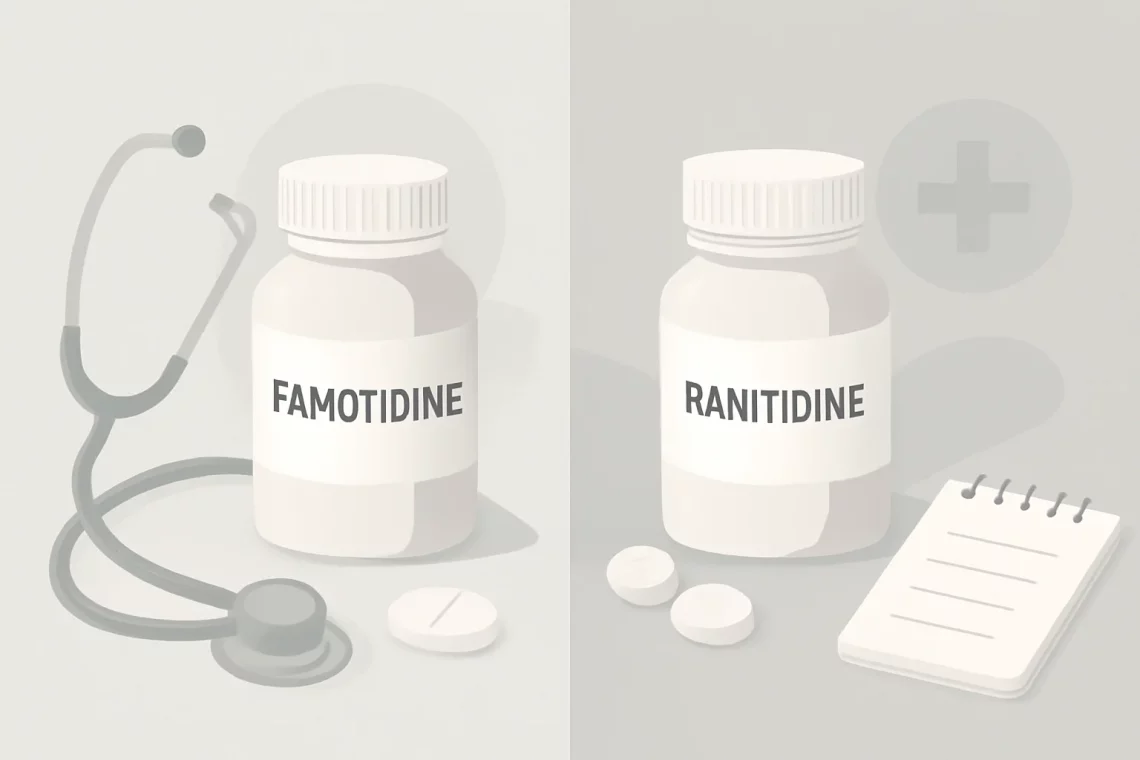-
Ranitidine vs Famotidine: Which Heartburn Relief is Better?
Ranitidine and famotidine are both medications commonly used to treat conditions related to excessive stomach acid. They belong to a class of drugs known as histamine-2 (H2) blockers, which work by reducing the amount of acid produced by the stomach. Understanding these medications and their differences can be crucial for individuals dealing with acid-related disorders, such as gastroesophageal reflux disease (GERD), peptic ulcers, and Zollinger-Ellison syndrome. As the prevalence of acid-related conditions continues to rise, it is essential for patients and healthcare providers to be informed about the available treatment options. While both ranitidine and famotidine are effective in managing these conditions, they differ in various aspects, including their mechanisms…
-
Ranitidine vs Famotidine: Which Antacid is Right for You?
Ranitidine and famotidine are two widely used medications in the realm of gastrointestinal health, primarily for their ability to reduce stomach acid production. As prevalent as heartburn and gastroesophageal reflux disease (GERD) are in modern society, the need for effective treatment options has led to the popularity of these drugs. Understanding the nuances between ranitidine and famotidine, their mechanisms of action, potential side effects, and other factors can be crucial for individuals seeking relief from acid-related disorders. Both ranitidine and famotidine belong to a class of medications known as histamine H2-receptor antagonists, which work by blocking histamine receptors in the stomach lining, thus reducing acid secretion. Despite their similar purpose,…
-
Esomeprazole vs Omeprazole: Which is Right for You?
Esomeprazole and omeprazole are both medications that belong to a class known as proton pump inhibitors (PPIs). These drugs are primarily used to treat conditions related to excessive stomach acid, such as gastroesophageal reflux disease (GERD), peptic ulcers, and Zollinger-Ellison syndrome. With the increasing prevalence of acid-related disorders, the importance of understanding these medications has grown significantly. Esomeprazole, often marketed under the brand name Nexium, is a specific isomer of omeprazole, which means that it has a slightly different chemical structure and may offer distinct pharmacological properties. Both medications work by blocking the proton pump in the stomach lining, effectively reducing the production of gastric acid. As a result, they…
-
Famotidine vs Ranitidine: Which Antacid is Right for You?
Famotidine and ranitidine are two medications commonly used to treat conditions related to excess stomach acid, such as gastroesophageal reflux disease (GERD), peptic ulcers, and gastritis. Both belong to a class of drugs known as H2 blockers, which work by inhibiting the action of histamine on the stomach’s H2 receptors. This action ultimately decreases the amount of acid produced by the stomach. Understanding the differences and similarities between these two medications can be crucial for patients dealing with acid-related disorders. While both famotidine and ranitidine serve similar purposes, they have distinct properties, side effects, and usage guidelines. The choice between the two might depend on various factors, including individual health…
-
Pantoprazole vs Rabeprazole: Key Differences and Uses Explained
Pantoprazole and rabeprazole are two medications that belong to a class of drugs known as proton pump inhibitors (PPIs). These medications are primarily used to treat various gastrointestinal disorders, including gastroesophageal reflux disease (GERD), peptic ulcers, and Zollinger-Ellison syndrome. By inhibiting the proton pump in the stomach lining, both pantoprazole and rabeprazole effectively reduce the production of stomach acid, providing relief from symptoms associated with excess acidity. While both medications serve similar purposes and are often prescribed for comparable conditions, they differ in their chemical composition, pharmacokinetics, and potential side effects. Understanding these differences can help patients and healthcare providers make informed decisions about which medication might be more suitable…
-
Understanding Animal Gastrointestinal Health and Its Importance
Understanding the intricacies of gastrointestinal health in animals is crucial for pet owners, veterinarians, and anyone involved in animal care. The gastrointestinal tract plays a vital role in an animal’s overall well-being, impacting digestion, nutrient absorption, immune function, and even behavior. A healthy gut helps ensure that animals receive the maximum benefit from their diets, while also preventing a multitude of health issues. The gastrointestinal system is a complex network that processes food, absorbs nutrients, and eliminates waste. It consists of various organs, including the stomach, intestines, and accessory organs like the liver and pancreas. Each component performs specific functions that together support the animal’s nutritional needs and health. Understanding…
-
Understanding Animal Gastrointestinal Health: Key Insights and Tips
Understanding the complexities of animal gastrointestinal health is crucial for pet owners, veterinarians, and animal enthusiasts alike. The gastrointestinal tract plays a fundamental role in overall well-being, influencing digestion, nutrient absorption, and even immune function. A healthy gut is essential not only for the effective processing of food but also for maintaining a balanced microbiome that supports various bodily functions. Animals, much like humans, can experience a range of gastrointestinal issues, from mild discomfort to severe disorders. Understanding the signs of gastrointestinal distress is vital for early intervention. Whether you own a dog, cat, or exotic pet, being aware of the nuances in their digestive health can lead to better…
-
Exploring the Benefits and Uses of Rectal Rockets in Health Care
The healthcare landscape continually evolves, driven by advancements in medical technology and a deeper understanding of patient needs. Among the many innovative solutions available today, rectal rockets, or rectal suppositories, have gained attention for their unique role in delivering medications. These small, cylindrical forms are designed to be inserted into the rectum, where they dissolve and release their active ingredients, allowing for quick absorption into the bloodstream. This method of administration can be particularly beneficial in scenarios where traditional oral intake is not viable or effective. The use of rectal rockets spans various medical fields and can address numerous health concerns. From providing relief for patients experiencing nausea and vomiting…






























